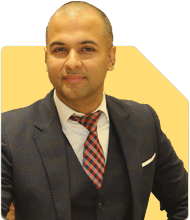Ramalingam Kalirajan |8204 Answers |Ask -Follow
Mutual Funds, Financial Planning Expert - Answered on May 09, 2024
He has an MBA in finance from the University of Madras and is a certified financial planner.
He is the director and chief financial planner at Holistic Investment, a Chennai-based firm that offers financial planning and wealth management advice.... more

I am currently 18 year. Currently i have a income of 60k per month for only 2 years and i have loan for 60 thousand also i have to do college for 4 years which cost me 4.5 lakh. Please suggest me where should i diversify the rest of amount for financial freedom
Given your monthly income of 60,000 rupees and a loan of 60,000 rupees, it's essential to prioritize debt repayment to avoid unnecessary interest costs. Allocate a portion of your income towards clearing the loan as soon as possible.
For your college expenses totaling 4.5 lakhs over four years, consider setting up a separate savings account or investment vehicle specifically for this purpose. Since your college tenure is relatively short-term, opt for low-risk options like fixed deposits or debt mutual funds to ensure the safety of your principal amount.
Now, for the remainder of your income, it's crucial to focus on building a strong financial foundation for the future. Consider diversifying your investments across different asset classes to mitigate risk and maximize returns over the long term.
Since you have a relatively short investment horizon of two years for your income, opt for safer options like fixed deposits, recurring deposits, or short-term debt mutual funds. These investments offer stability and liquidity, making them suitable for achieving your financial goals within the specified timeframe.
As you progress in your career and your income grows, consider gradually shifting towards more aggressive investment options like equity mutual funds or stocks to build wealth over the long term. However, ensure you have a solid understanding of these investment vehicles and seek guidance from a Certified Financial Planner before venturing into them.
Remember, the key to financial freedom lies in disciplined saving, prudent investing, and continuous learning. Start early, stay focused on your goals, and you'll pave the way for a secure and prosperous future.
Best Regards,
K. Ramalingam, MBA, CFP,
Chief Financial Planner,
www.holisticinvestment.in
You may like to see similar questions and answers below
Ramalingam Kalirajan |8204 Answers |Ask -Follow
Mutual Funds, Financial Planning Expert - Answered on Apr 09, 2024
Jinal Mehta | Answer |Ask -Follow
Financial Planner - Answered on Jun 24, 2024
Ramalingam Kalirajan |8204 Answers |Ask -Follow
Mutual Funds, Financial Planning Expert - Answered on Jul 14, 2024
Ramalingam Kalirajan |8204 Answers |Ask -Follow
Mutual Funds, Financial Planning Expert - Answered on Nov 02, 2024
Samraat Jadhav |2250 Answers |Ask -Follow
Stock Market Expert - Answered on Apr 08, 2025
T S Khurana |438 Answers |Ask -Follow
Tax Expert - Answered on Apr 08, 2025
T S Khurana |438 Answers |Ask -Follow
Tax Expert - Answered on Apr 08, 2025
Mihir Tanna |1043 Answers |Ask -Follow
Tax Expert - Answered on Apr 08, 2025
Harsh Bharwani |79 Answers |Ask -Follow
Entrepreneurship Expert - Answered on Apr 08, 2025
Milind Vadjikar |1157 Answers |Ask -Follow
Insurance, Stocks, MF, PF Expert - Answered on Apr 08, 2025
Milind Vadjikar |1157 Answers |Ask -Follow
Insurance, Stocks, MF, PF Expert - Answered on Apr 08, 2025
Milind Vadjikar |1157 Answers |Ask -Follow
Insurance, Stocks, MF, PF Expert - Answered on Apr 08, 2025
Milind Vadjikar |1157 Answers |Ask -Follow
Insurance, Stocks, MF, PF Expert - Answered on Apr 08, 2025
Ramalingam Kalirajan |8204 Answers |Ask -Follow
Mutual Funds, Financial Planning Expert - Answered on Apr 08, 2025


























.jpg)